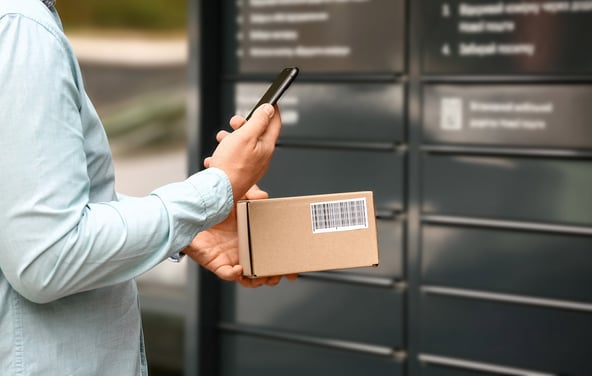In the ever-evolving world of logistics, as we step into 2024, the industry is pivotal, influenced by emerging technologies, global events, and evolving consumer expectations. This article offers an overview of the trends shaping the year ahead, emphasizing the importance of a single logistics partner for navigating the complexities of the modern supply chain.
1. Sustainability: A non-negotiable trend
Over the past few years, sustainability has become more of a must than an option, and rightly so. A sustainable focus is essential for politicians, energy companies, and real estate owners, and it should also be seen as a general requirement for the economy. Even if this is still valid, the recent economic development and the resulting price increases in e-commerce mean that the most sustainable logistics solution is not the number one choice for consumers. However, in a study conducted by Seven Senders about Sustainability in European e-commerce, results show that consumers increasingly prioritize sustainability in e-commerce, with 81% expressing a desire for greater corporate focus on the topic. While surveys show a willingness to compromise, there’s often a gap between stated preferences and actual purchasing behavior. Notably, the willingness to pay for sustainable shipping has risen from 54% to 70% in a year, emphasizing consumers’ growing importance of sustainable practices when buying online.
Strategies for reducing the environmental impact of e-commerce
As they grow, most online retailers have recognized the cost savings and waste reduction from reducing packaging and using reusable and recyclable packaging concepts. E-tailers are reassessing the sourcing and transportation of goods, acknowledging the environmental impact of air transport from Asia versus bulk shipments by sea1.
When talking about the first mile, regardless of the type of vehicle fleet used by our carriers, we focus on reducing the number of journeys. We achieve this by optimizing route planning according to the respective customer location and shipping volume. In the so-called “milk run”, various customers in geographical proximity are picked up by a vehicle, consolidating this volume and bringing it to a cross-dock hub conveniently located for the destination countries. Here, the customer consolidation is broken up, and the pallets are consolidated and loaded according to the European destination countries and last-mile carriers. Intelligent planning tools are already being used by last mile carriers throughout Europe for transport to the end consumer, with the aim of reducing costs and Co2 emissions.
Carbon-neutral shipping with 7SGreen
Offsetting carbon emissions in the shipping process is something we also help our customers with. With 7SGreen, for three cents per shipment, shippers can proactively engage in environmental protection and offset the transport-related CO2 emissions from shipments E2E by supporting certified climate protection projects. The DEKRA-certified calculation of CO2 emissions per parcel across the entire supply chain enables precise offsetting, and annual certificates provide an overview of the emissions saved. This commitment to sustainability is a valuable aspect that can be communicated to online shoppers, showcasing a brand’s dedication to environmental responsibility.
2. Data-driven decision making
Data-driven decision-making is a crucial trend in 2024 logistics, and Seven Senders is at the forefront. Quick decisions are vital in logistics, and leveraging data for informed choices provides a competitive edge. Our commitment to data-driven decisions is threefold: democratizing choices, optimizing processes and promoting trust across the supply chain.
Beyond internal operations, we leverage our market knowledge to empower our customers with direct access to analytics, enabling proactive measurement of carrier performance for optimized shipping results. One factor in the potential reduction of CO2 emissions here is the optimization of the route and the adjustment of vehicle sizes in the event of deviating quantities, based on data that is available in real time in order to be able to implement adjustments as quickly as possible and in a well-founded manner.

3. Consumer expectations
Meeting consumer expectations is crucial in online retail. Factors like delivery speed, costs, convenience, transparency, and sustainability play a pivotal role in online retailers striving to succeed in this competitive market. Understanding these elements is essential to meet, anticipate, and surpass the demands of discerning European online consumers.
As a one-stop solution for cross-border parcel shipping in Europe, we collaborate with an extensive carrier network, including local heroes who deeply understand their market’s needs. The advantage of having multiple last-mile carriers in each market goes beyond catering to local demands and the retailer’s requirements; it also enables us to respond swiftly in case one carrier encounters challenges.
The increasing demand of convenient delivery options like out-of-home
The convenience of out-of-home deliveries (OOH) is gaining more popularity throughout Europe, and it’s expected to make up over 50% of deliveries in the Nordics, France, and Germany, among a couple more countries2. Customers increasingly value the flexibility of choosing alternative delivery locations, contributing to a positive shopping experience. By recognizing this, Seven Senders expanded its API services to seamlessly access the diverse world of OOH carriers through the PUDO Locator. This software enables merchants to tap into a comprehensive range of European OOH carrier services in a standardized and user-friendly format. By utilizing the PUDO Locator, businesses can realize cost savings, enhance their delivery NPS, and significantly reduce last-mile emissions, making strides toward a more sustainable and customer-centric approach to online retail.

4. Cross-border shipping to non-EU countries
Expansion into valuable markets such as the UK and Switzerland should be part of every online retailer’s goal this year. Firstly, the UK and Switzerland boast mature and thriving e-commerce markets, presenting significant business opportunities. These countries have a high level of digital adoption, tech-savvy consumers, and strong purchasing power, making them attractive markets for online retailers. Switzerland ranks among the top three European markets for cross-border shopping, with 61% of online transactions dedicated to cross-border purchases3.
Secondly, entering these markets allows businesses to tap into diverse consumer preferences and behaviors, gaining insights into the dynamics of different regions. Understanding and adapting to local nuances is essential for success in the global e-commerce landscape.
Furthermore, the UK and Switzerland are known for their stable economies and transparent regulatory environments. Expanding to these countries provides a solid foundation for sustainable growth.
Lastly, establishing a presence in the UK and Switzerland enhances the geographical reach of e-commerce businesses, fostering international brand recognition and opening doors to a broader customer base.
However, expanding into these markets may raise concerns for online retailers due to customs complexities. Partnering with a skilled logistics provider like Seven Senders is convenient in these scenarios. Our streamlined customs clearance solution reduces the challenges associated with international shipping, providing online shops with efficient cross-border operations and high visibility of the whole supply chain. By choosing Seven Senders, businesses gain a strategic partner that simplifies customs procedures and unlocks the full potential of international expansion.
Endnotes:
1. Oliver Wyman: Report; is e-commerce good for Europe, 2020, p. 9
2. Out of home delivery in Europe 2023, 2023 Analysys Mason and Last Mile Experts, p. 121
3. https://ecommercenews.eu/ecommerce-in-europe/ecommerce-switzerland/